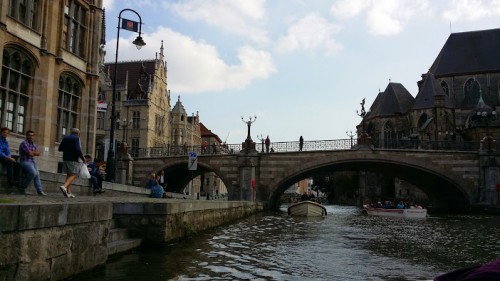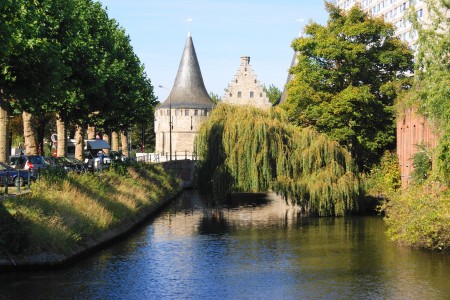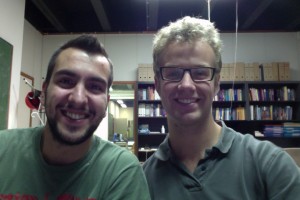A report on WPMSIIP 2014
Posted on October 27, 2014 by Arthur Van Camp and Stavros Lopatatzidis[ go back to blog ]
The 7th edition of the Workshop on Principles and Methods of Statistical Inference with Interval Probability (abbreviated as WPMSIIP in the most pronounceable way), organised by the SYSTeMS Research group of Ghent University, took place in Ghent from 8 until 12 September 2014.

There were 17 participants from 6 countries.
Every morning and afternoon had its own session in which 2 or 3 persons presented something about a specific topic, in order to stir up the debate, allowing for ample time to discuss and work together.
The first session, on Monday morning, was devoted to statistics. The Institut für Statistik group from the Ludwig Maximilians-Universität Munich led the discussion. All three enthusiastic presenters, Gero Walter, Georg Schollmeyer and Julia Plaß, have their roots in LMU.
In the afternoon, the session was about classification. Unfortunately, prof. Lev Utkin could not make it to Ghent, but luckily Frank Coolen and Paul Fink led the debate lively.
The next session, on Tuesday morning, was about choice functions. Also very unfortunately, Paul Pedersen was unable to come to Ghent. Arthur Van Camp stirred up the discussion about choice functions, and Gert de Cooman filled the gap with a presentation about the foundations of parametric predictive inference.
The next session was foundation, in the afternoon. Enrique Miranda enlightened the audience with a technical discussion about independent products on infinite spaces, Marco Cattaneo warned us about consequences of updating with imprecise probability models, and Erik Quaeghebeur puzzled our minds with a philosophical problem called “Sleeping beauty”.
Wednesday morning was reserved for open topics. Thomas Augustin gave a nice overview of the history of statistics with imprecise probabilities, Qianru Ge introduced an application in reliability optimisation, and Vladimir Vovk talked about the invalidity of NPI.
In the afternoon, we all went to the Ghent city brewery Gruut, where they introduced us both theoretically and pratically in the brewing process. After that, we discovered Ghent from another side: from the side of the water. We sailed with two boats along the inner canals of Ghent.


On Thursday morning there was a session about bivariate models and copulas. Frank Coolen showed us how to use copulas for inference for bivariata data, and Enrique Miranda “crushed” the podium with results on bivariate p-boxes. Both speakers granted us with lots of interesting discussion material.
After that, in the afternoon, we had a session about credal networks. Cedric De Boom presented the work he did for his master’s thesis, and Jasper De Bock saddled us with many challenging questions regarding independence.
The last day started with a session about stochastic processes, where Francesca Mangili discussed with us about Bayesian nonparametric methods for hypothesis testing. The session ended with Stavros Lopatatzidis who introduced imprecise queueing systems, thereby using the public as a real life example.
The last session of this WPMSIIP was about game-theoretic probability. With Vladimir Vovk presenting material on conformal predictions, and Gert de Cooman introducing a new point wise ergodic theorem, we had two very interesting speakers to end the seventh WPMSIIP.
We have the feeling that the workshop provided food for discussion, revealed several aspects of imprecise probabilities in real life—such as the betting framework— and created the opportunity to better know our international colleagues a bit more informally. We were very pleased to organise this workshop, together with Gert and Jasper.
